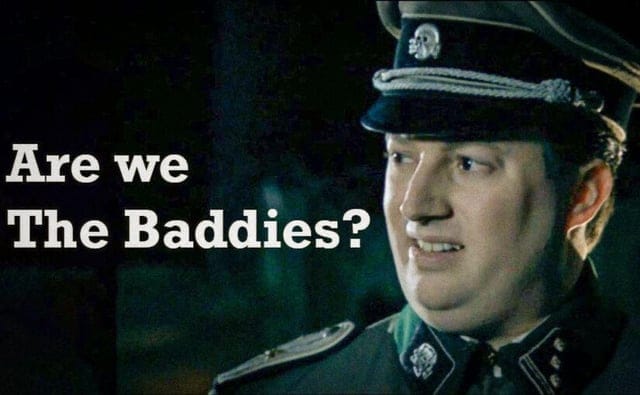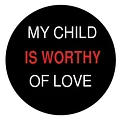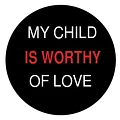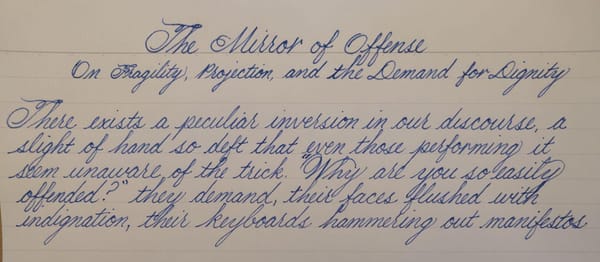Are you the oppressor?

For the past few years, I've struggled to maintain a close relationship with my now 17-year-old transgender child. As a parent who firmly believes in the immutable reality of biological sex, I find myself constantly at odds with my child's insistence that they are not the gender they were assigned at birth. Despite our shared interests and the time we spend together, there's an undeniable tension between us, a barrier that I can't seem to break through.
As a self-proclaimed gender-critical parent, I pride myself on my commitment to truth and my unwillingness to compromise my values. I see myself as a brave defender of reality, standing up against the "transgender agenda" that threatens to corrupt our children and undermine the very fabric of society. But if I'm being honest, my gender-critical views often leave me feeling isolated and misunderstood, even within my own family.
I've always been a bit of a worrier, prone to catastrophizing and seeing myself as the victim in any conflict. When my child first came out as transgender, I was consumed by fear and uncertainty. I couldn't shake the feeling that I was losing my child to a dangerous ideology, that they were being brainwashed by a cult that would lead them down a path of irreversible harm.
In my desperation to save my child, I threw myself into the gender-critical movement. I read everything I could find on the supposed harms of transitioning, the "social contagion" and “ROGD” of gender identity, and the nefarious forces behind the "transgender lobby." I found solace in the work of experts like Lisa Marchiano, Lisa Littman, and Patrick Ryan (Grzanka), who seemed to validate my worst fears and provide me with a roadmap for fighting back against the "trans agenda." Josie Alexander and Dina Samuels wrote a book and made an online community together for parents just like me, whose stories and essays helped me find feel not alone, the commenters gave me the encouragement to stay the course and never give up hope - even when all seemed lost.
But as much as I tried to convince myself that I was doing the right thing, I couldn't ignore the growing distance between my child and me. Every time I challenged their identity or expressed my disapproval of their transition, I could feel them pulling away, retreating behind a wall of anger and resentment.
I told myself that I was just being a good parent, that my love for my child demanded that I protect them from the dangers of the "trans cult." This is what so many parents said for me to do, and Josie, an RN. Colin Wright, a biologist, and Lisa Littman, a doctor and public health researcher all were telling me, advising me, or educating me to do through their books and articles. Even psychotherapist Stella O’Malley, who wrote the forward to one of the books I bought. But deep down, I knew that my gender-critical views were driving a wedge between us, that my inability to accept my child for who they truly are was causing them immense pain and confusion.
In my more honest moments, I wondered if I was really the oppressor in this situation. Was I prioritizing my own fears and prejudices over my child's happiness and well-being? Was I using my gender-critical beliefs as a shield to avoid confronting the reality of my child's identity and the changes they were going through?
I tried to reposition myself in our relationship, to find a way to maintain my beliefs while still being there for my child. But every attempt at compromise felt like a betrayal of my values, a capitulation to the "transgender agenda" that I had convinced myself was the enemy.
I found myself caught in a painful dilemma, torn between my love for my child and my commitment to the my gender-critical ideology driven by the need, the focus, the drive to protect my child at all costs. I only knew how to do this through the truths being taught to me about the basic biological facts of sex and gender, and the regular advice I received online from other parents at PITTparents, from the studies that everyone outside these online circles says were false or mischaracterized or used to mislead, to the books from the various people who started and managed those communities. I wanted to be close to my child, to support them and share in their joys and struggles, but I also wanted to save them from what I saw as a dangerous and misguided path. After all, these RNs, biologists, public health researchers, doctors, scientists, and all the stories can’t be wrong, can they?
It's taken me a long time to realize that this conflict is more about my own fears and biases than it is about my child's well-being. My gender-critical views have become a lens through which I see the world, a way of asserting control over a situation that feels scary and uncertain.
But in clinging to these views, I've risked losing the very thing that matters most to me: my relationship with my child. I've come to see that true love and acceptance means supporting my child unconditionally, even when it challenges my own worldview. It took me a long time to learn, understand, and accept that SEGM and Genspect are hate groups. It took me even longer to realize that I was just another revenue stream, and those substacks and online communities? Reality’s Last Stasnd? PITTparents.com, Gender: A wider Lens, buttonslives, and others? Recruitment and indoctrination sites designed to draw me, and parents like me, into their echo chambers. To feed of the hurt and fear we are in, to fuel the anger and outrage we all feel. It creates a somewhat self sustaining vehicle designed to draw folks in, and subscribe. To buy the books. To donate their money and time. To volunteer their stories and emotional labor, so it can be used as lures and bait to draw in and trap more parents.
But you want to know what really opened my eyes? When my child was devastated at one of our longer round of arguments, and would not talk to or see me for three days. Who was there to comfort me? Online comments from parents helped, but they were not here help. They did not have to see or deal with the tragic effects their advice had on my family. Christina and Colin did not stop by to help make dinner because I was just too upset or depressed to do so. Matt, Ben, and Patrick did call me to check up on me and offer to do the gardening for me, because my husband took my kid to stay with their grandma and grandpa for the weekend. Stella, Josie, and Dina were not here to help me pick up the pieces of my kid and my family. Neither Lisa was there to help me put the house back in order after a severe family meltdown. And you know what? My money sure helped them out. My time trying to support other parents and boost this article, restack that essay, echo the kind words or recommend these books and papers to others sure gave them a wider exposure and a sense of credibility. I sure helped them succeed. And at what cost? My money? My time? both true, but the greatest cost of all was my kid. It was costing me the most precious thing in the world to me.
So to all the gender-critical parents out there who may be struggling with similar dilemmas, I urge you to take a step back and examine your own assumptions and biases. Ask yourself if your commitment to your ideology is worth the price of your child's happiness and well-being. Because you may be struggling, you may be grieving and suffering right now, but the hurt and harm you do to your child by clinging to this ideology will long outlast you when you are gone, and live on in your child.
Remember that being a good parent isn't about imposing your own beliefs and expectations on your child, but about creating a safe and loving environment where they can explore their own identity and find their own path in life.
It's not always easy, and it may require letting go of some deeply held convictions, but in the end, nothing is more important than the bond of love and trust between parent and child. Don't let your gender-critical views make you the oppressor in your own family. Choose love, choose acceptance, and choose to be there for your child, no matter what.


